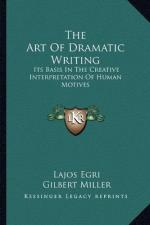
|
| Name: _________________________ | Period: ___________________ |
This quiz consists of 5 multiple choice and 5 short answer questions through Book II: Character, Chapters 1 - 3.
Multiple Choice Questions
1. When did Lajos Egri die?
(a) 1970.
(b) 1967.
(c) 1963.
(d) 1969.
2. What does Lajos Egri claim to be the premise of King Lear?
(a) "Blind trust leads to destruction."
(b) "Ruthless ambition leads to its own destruction."
(c) "Love rewards death."
(d) "Jealousy destroys itself and the object of its love."
3. Who is Romeo's cousin in "Romeo and Juliet"?
(a) Friar John.
(b) Abram.
(c) Benvolio.
(d) Mercutio.
4. When was Lajos Egri born?
(a) 1877.
(b) 1899.
(c) 1888.
(d) 1885.
5. What French author and dramatist is cited in Book I: The Premise as stating "How can you tell what road to take unless you know where you are going?"
(a) Henri Bergson, the Older.
(b) Jean-Paul Sartre, the Older.
(c) Alexandre Dumas, the Younger.
(d) François Mauriac, the Younger.
Short Answer Questions
1. What is needed to make life keep constantly going, according to the author in Book II: Character, Chapter 3: The Dialectical Approach?
2. What does Lajos Egri claim is the premise of "Othello"?
3. What does Lajos Egri state first and foremost the writer must have of his characters?
4. Whom was Plato a student of?
5. What does the author claim causes motion in Book II: Character, Chapter 3: The Dialectical Approach?
|
This section contains 213 words (approx. 1 page at 300 words per page) |

|




